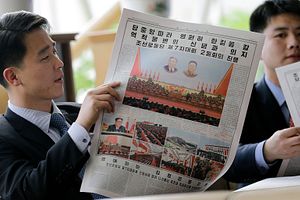If Donald Trump manages to stride into North Korea and meet Kim Jong-un, for once his tweets and non sequiturs at rallies in Rust Belt states will not precede him – at least for the North Korean public. In a country with miniscule rates of international internet access and some of the tightest censorship controls in the contemporary world, what the North Korean people see and read is different in the extreme from our dominant narratives.
How have North Koreans been encouraged by their state to perceive the developments of the last 10 weeks? As of writing, the country’s media is keeping silent on the prospect of a Kim-Trump summit, a tactic that is not all that surprising given the sheer amount of sensitive work there is to do behind the scenes. An examination of North Korean public media since the beginning of 2018 nevertheless has its benefits. It reveals a few aspects of what Kim is ultimately looking for with the overall charm offensive that has been ongoing since the beginning of 2018, and how North Korea looks to manage its information strategies relative to diplomacy and internal control in the months ahead.

































